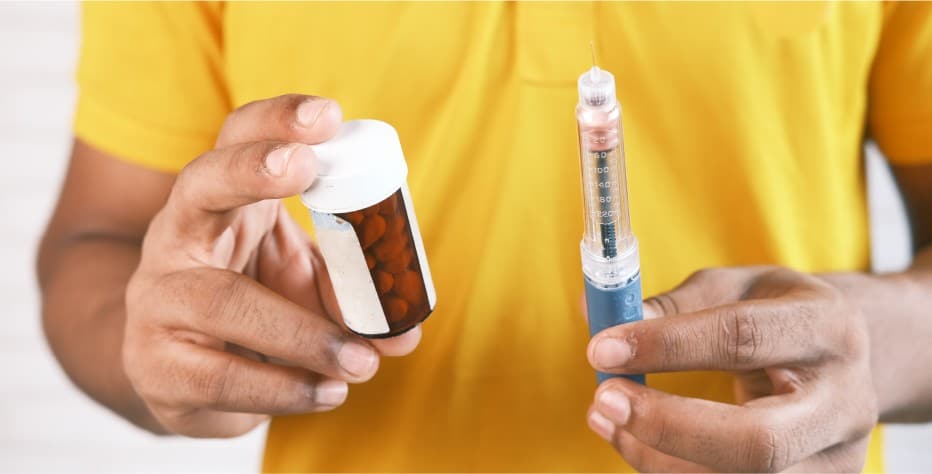What is Diabetes?
Diabetes happens when your body isn’t able to take up sugar (glucose) into its cells and use it for energy. This results in a build-up of extra sugar in your bloodstream. Poorly controlled diabetes can lead to serious consequences, causing damage to a wide range of your body’s organs and tissues – including your heart, kidneys, eyes, and nerves.
Types Of Diabetes:
- Diabetes – Type 1: This type is an autoimmune disease, meaning your body attacks itself. In this case, the insulin-producing cells in your pancreas are destroyed. Up to 10% of people who have diabetes have type 1. It’s usually diagnosed in children and young adults (but can develop at any age). It was once better known as “juvenile” diabetes. People with type 1 diabetes need to take insulin every day. This is why it is also called insulin-dependent diabetes.
- Diabetes – Type 2: With this type, your body either doesn’t make enough insulin or your body’s cells don’t respond normally to the insulin. This is the most common type of diabetes. Up to 95% of people with diabetes have type 2. It usually occurs in middle-aged and older people. Other common names for type 2 include adult-onset diabetes and insulin-resistant diabetes. Your parents or grandparents may have called it “having a touch of sugar.”
- Pre-diabetes: This type is the stage before type 2 diabetes. Your blood glucose levels are higher than normal but not high enough to be officially diagnosed with type 2 diabetes.
How To Manage Diabetes
Diabetes affects your whole body. To best manage diabetes, you’ll need to take steps to keep your risk factors under control and within the normal range, including:
- Keep your blood glucose levels as near to normal as possible by following a diet plan, taking prescribed medication and increasing your activity level.
- Maintain your blood cholesterol (HDL and LDL levels) and triglyceride levels as near the normal ranges as possible.
- Control your blood pressure. Your blood pressure should not be over 140/90 mmHg.
- You hold the keys to managing your diabetes by:
- Planning what you eat and following a healthy meal plan. Follow a healthy diet?(vegetables, whole grains, beans, fruits, healthy fats, low sugar). Follow diets that contain nutrition and fiber and are low in fats and calories. See a registered dietitian for help understanding nutrition and meal planning.
- Be Sure To Exercise Regularly. Try to exercise at least 30 minutes most days of the week. Walk, swim or find some activity you enjoy.
- Lose weight?if you are overweight. Work with your healthcare team to develop a weight-loss plan.
- Taking medication and insulin, if prescribed, and closely following recommendations on how and when to take it.
- Monitoring your blood glucose and blood pressure at home.
- Keeping your appointments with your healthcare providers and having laboratory tests completed as ordered by your doctor.
- Quit Smoking.
You have a lot of control on a day-to-day basis in managing your diabetes!
Treatment for Diabetes
Insulin remains the mainstay of treatment for patients with type 1 diabetes. Insulin is also an important therapy for type 2 diabetes when blood glucose levels cannot be controlled by diet, weight loss, exercise, and oral medications.
Ideally, insulin should be administered in a manner that mimics the natural pattern of insulin secretion by a healthy pancreas. However, the complex pattern of natural insulin secretion is difficult to duplicate. Still, adequate blood glucose control can be achieved with careful attention to diet, regular exercise, home blood glucose monitoring, and multiple insulin injections throughout the day. Here are types of insulin that are available:
- Rapid-acting insulin begins to take effect 5 minutes after administration. Peak effect occurs in about 1 hour, and the effect lasts for 2 to 4 hours. Examples are insulin lispro, insulin aspart, and insulin glulisine.
- Regular insulin takes effect within 30 minutes, peaks at 2 to 3 hours after injection, and lasts 3 to 6 hours total.
- Intermediate-acting insulin typically begins to lower blood glucose about 2 to 4 hours after injection, peaks 4 to 12 hours later, and lasts about 12 to 18 hours.
- Long-acting insulin takes effect within 6 to 10 hours. It usually lasts?for 20 to 24 hours. The long-acting insulin analogues include glargine and detemir. The?lower glucose levels fairly evenly over a 24-hour period (without major peaks or troughs).
The major goal in treating diabetes is to control blood sugar (glucose) levels within the normal range, with minimal excursions to low or high levels.
Type 1 diabetes is treated with: insulin, exercise along with a type 1 diabetes diet.
Type 2 diabetes is treated: First with weight reduction for a type 2 diabetes diet along with exercise. Diabetes medications (oral or injected) are prescribed when these measures fail to control the elevated blood sugars of type 2 diabetes. If other medications become ineffective treatment with insulin may be initiated.
Why is it important to check my blood glucose level?
Checking your blood glucose level is important because the results help guide decisions about what to eat, your physical activity, and any needed medication and insulin adjustments or additions.
If you have diabetes, your body isn’t able to properly process and use glucose from the food you eat. There are different types of diabetes, each with different causes, but they all share the common problem of having too much glucose in your bloodstream. Treatments include medications and/or insulins. Some types of diabetes can be prevented by adopting a healthy lifestyle.
USA Script Helpers is the best option where you can buy Canadian insulin online. USH is here to help Americans to have access to insulin for Type 1 and Type 2 Diabetes at affordable prices. USA Script Helpers carries a wide variation of human medications as well as PetMeds with the best prices guaranteed. Your health is important to us.


















